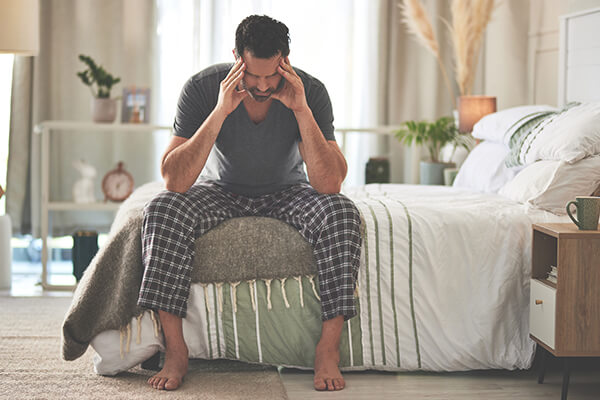What are potential sleep apnoea symptoms?

March 7th 2023
Sleep apnoea is caused by breathing being stopped while you sleep. While snoring and sleep apnoea are generally regarded as going hand in hand in many cases, it can be difficult to identify other, less common warning signs of sleep apnoea. Here we’ll discuss what to look out for if you’ve been wondering if you might be suffering from sleep apnoea symptoms.
What are the symptoms of sleep apnoea?
As a result of sleep apnoea, there are several common symptoms that occur at night including:
- Snoring1
- Night sweats2
- Frequent urination3
- Insomnia4
During the night, it’s not always easy for us to identify these warning signs, but during the day, there are also many symptoms of sleep apnoea which include:
- Fatigue5
- Morning headaches5
- Daytime sleepiness5
- Depressed mood 5
- Decreased libido and/or sexual disfunction6
What to do if you think you might have sleep apnoea?
If you are initially unsure about your symptoms, you can always take our quick 3-minute online sleep assessment to see how likely it is that you may have the disorder.
It may be time that you get tested for sleep apnoea if you do suffer from some of the above-mentioned symptoms. Symptoms that reoccur over time might be indicative of sleep apnoea so talking to a specialist or your general practitioner is crucial.
How can I be tested and diagnosed?
If your healthcare professional does suspect that you may have sleep apnoea, they will firstly perform screenings with questionnaires and discussions. If they then think it’s appropriate, they will ask you to take a sleep test. A sleep test is a non-invasive, overnight test that’s used to diagnose sleep apnoea and other sleep-related conditions. It can take place in a hospital or in your own home.
Although they may sound daunting, sleep tests are accurate and non-invasive. Sensors are placed on your body to track relevant details like your blood oxygen levels, pulse, brain waves and eye movements. The sensors are connected to a recording device so your sleep doctor can analyse and assess your results.
Your sleep physician will then review the results of your sleep test and might give you a diagnosis of sleep apnoea or another sleep-related condition.
Remember, diagnosis of sleep apnoea is the first step in finding the right solution for you. So, for more information on sleep apnoea and common symptoms, visit your local healthcare professional or specialist, take our free online assessment, and find out more about the disorder here.